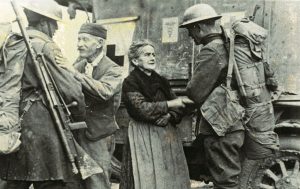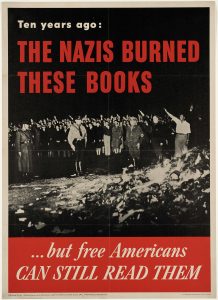World War I U-Boat Footage
This is a video released by the U.S. Army Signal Corps during WWI, it is a German U-Boat’s own recording during its mission, which later got captured by the US army. This less than a minute video recorded the sinking of multiple cargo ships belonging to the US during the U-Boat’s mission. The sinking of American civilian cargo ships to the UK and other Allied Powers fighting against the Central Powers are deemed exceedingly immoral and unacceptable by the Americans. Instead of extinguishing American War passion, it only encouraged the US to eventually joining the Allied Powers in WWI. By exposing its unethical war behaviors, the Germans are proven to be morally inferior to the Americans, and the Americans have the obligation to spread their way of living and freedom across the Atlantic and onto Germany.
“308th Infantry Division soldiers liberating a French town in 1918”, Angela Wallace, Photograph (1918)

This photo was taken by the end of WWI when the Allied forces were making steady progress on the Western Front against the Germans. Not much is known about the photographer who took this photo. In this photo, two American soldiers who apparently belong to the 308th infantry division were warmly welcomed by an old French couple from a town newly liberated from the Germans. This photograph captured exactly the essence of “American exceptionalism”, of bringing freedom to other non-Americans. In this case, the US ‘s involvement in the War really did bring liberty and freedom to Europeans who are captured by the German Empire. But very unlike the US’s perceived line of action during the previous era, the US didn’t have any territorial aspirations in its action during the WWI, and it wasn’t imposed by Americans, but the Americans are promptly invited by the European to exercise “American exceptionalism” and bring freedom from the Germans to them.
“Ten years ago the Nazis burned these books; … but free Americans can still read them”, United States Office of War Information, Poster (1943)

This anti-Nazi poster issued by the Office of War Information during the initial involvement of the US in WW2 depicted a mob of Nazis burning banned books and giving Nazi salutes. The poster then compared the level of freedom that Germans under Nazi rules enjoy with those that Americans enjoy, highlighting the difference between the two by stating that the “free Americans” can read books that Nazi Germans burned ten years ago. This appealed to “American exceptionalism” by focusing on the freedom that’s available to Americans but not to Germans, thus the Americans are “exceptional” comparing to the Nazi Germans, and should spread America’s freedom and liberty to Germans who are deprived of it by the Nazis.
